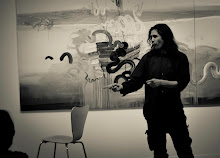One of my odder 'guilty' pleasures is watching philosophy in action on YouTube. Why guilty? Because the philosophers I watch are all French, and I speak very little French. I am there, not watching them to learn anything, I am merely watching 'thought in action', in a pure form (well at least a form unflustered by the urgency to understand).
Watching too many of these videos and three things strike me. Firstly, there is the real care and yet very complex rhythms and flows of the thinker's speech and thought. They are not speaking in steady streams, even when they are out working out ideas they know very well. On the contrary their speech flows like a river, with rapids, eddies, torrents, strange backwards flows, as well as steady currents, taking one somewhere. Their conversation really is a journey therefore, and as about as far way from normal discussion as you can get. This is not a point being argued for or defended, so much as a flowing experiment in language. It is a flow which I find hypnotising even across the divide of language.
Secondly, to watch Foucault or Deleuze in action is to free one's mind of so many idiocies that are written by their detractors, who want to squeeze their thought into simplistic ideas (and accuse them of this or that). A parallel world of 'criticism' and of 'near' thought, where personality, 'popular' psychology, bad biography, national prejudices, and the fear which so many commentators appear to have about thinking, fuse and coalescence to give us Foucault the pervert, and fascist; and Deleuze the fool, and madman. To watch them in action is to see real philosophy, with all its very carefully nuances, and all its being necessarily thoroughly thought through. But more than that, one gets the feeling, from the voice, from the reaction of others, from the mannerisms, of the real compassion of this thinking. The thought is therefore really reaching out to others, in a resonance beyond simple characterisation or even identity. There might be a poetry in the nuance that is open to twisting by others or by history, but this is not there in the compassion of the thinking itself. But in a sense this is the point - the power and richness of an idea lies in its ability to say many things, and have many accords. It is not just Foucault who can be said to be fascist, but by the same logic Nietzsche, Spinoza, Plato, or indeed pretty much any one whom any critic does not care for... The fact that it is twisted, is of course the twister's issue, while the fact that the idea has the resources to be worth twisting relates back to its original rhythm and power; In short it is a black tribute to the original thought itself.
Thirdly watching a great thinker in action is very far from watching a discussion. Even great thinkers together are not discussing, so much as merging flows, and creating counter eddies in one another's thoughts. Philosophy in true philosopher's hands is less about straightforward discussion with its refrain of 'I respect your opinion but...' and more about flows of thought that capture imaginations, and minds, so that we become a part in it. Great thought therefore reaches inside us all from an unthinkable outside and so enriches minds and allows then to think differently, and it is by this criterion we always judge it. Real philosophy is not really a matter of discussions or endless legalistic 'this is my case' type arguments. A thinker might well not work for their readers or lookers on, but that does not matter, for one of the joys of the world is that one does not have to like everyone, and one can accept that some are likeable in spite of one's own feelings or thoughts or perceptions. Philosophy's true power is, and you can see this in the reaction of the audience and the care of thought in action, to give minds deeper resources, and polish up its power to see anew, a power that does not 'discuss' in conventional discussion form, that well.
All of which I suppose explains why for me, at least, philosophy is very close to being always performance. It reaches out into its audience, and is only good because it challenges and enriches them, using as its currency ideas which are themselves infused by passion, and language. Like good poetry or writing, good philosophy, should leave you wanting more, should also inspire you to provide that 'more' yourself, so that we are all inspired to think for ourselves. Perhaps the only difference is that ideas, if they are really great, should become genuinely part of the living fabric of one's thought as it develops and evolves (in a way very distinct for the bon mots and quotes of a great writer). Perhaps it this fact that makes watching the ideas being unwound in another language so mesmerising, for one is watching that enrichment of minds in action, without being a part of it. That is, one is experiencing in its most basic form, the performance of philosophy, and it is wonderful!


No comments:
Post a Comment